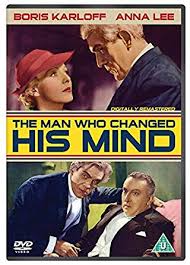
“You understand Laurience? One day you’ll realize how little you do.”
Dr. Laurience (Boris Karloff) was, at one time, a respected man of science. He believed that the origins of a person’s mind and soul were not reliant on the body. That one’s mind could exist in another body. The rest of the scientific community laughed and discredited him. He began working in secret to prove his theory. He hires a promising young surgeon, Clare Wyatt (Anna Lee) to assist him in his run down laboratory. The only companion he has is a cantankerous invalid named Clayton (Donald Calthrop). Laurience’s experiments have allowed him to transfer the mind from one chimpanzee to another.
Clare’s wanna be fiancée Dick Haslewood (John Loder) follows her to the mansion Laurience is working in. Dick is also a newspaper reporter. He writes a story about Laurience for his paper. His father, Lord Haslewood (Frank Cellier) happens to own the paper. He is impressed with the article and with Laurience. He sets Laurience up in a state of the art laboratory and allows him to continue his research.
When Laurience gives a lecture to his peers on his findings he is again laughed at and ridiculed. Laurience goes over the deep end. Lord Haslewood is furious and wants Laurience to get rid of his notes and stop his experiments. Laurience, in a fit of fury, transfers Lord Haslewood’s mind to Clayton and vise versa. The trauma of the transference causes Clayton’s body to die, thus killing Lord Haslewood’s mind. Clayton, now in Haslewood’s body, finds out that his new body is not in good shape. It is slowly dying. Clayton wants another body. He wants Dick’s body.
In the meantime Laurience falls in love with Clare. When he realizes that Clare is in love with Dick, he decides that he should have Dick’s body and not Clayton. To do that, he needs to first get rid of Clayton. The best way to do that is to kill Haslewood’s body.
“The Man Who Changed His Mind” AKA “The Man Who Lived Again” was released in 1936 and was directed by Robert Stevenson. The movie is a British science fiction/horror film.
It is rather short, about 66 minutes, and fast paced. Almost too fast paced. There was a lot thrown into those 66 minutes. There is some decent character development, the history of the doctor, and why, even early on, he is a little mad. The build up of the experiments, then the build up of the doctor by Haslewood. After that is the down fall and all the wonderful insanity that Karloff puts into his character. It moves quickly and you know most of the time where it is going but all you can do is hold on and enjoy the ride.
Sometimes I wonder what makes a mad scientist. Is it the single focused passion for an idea, the chemicals they breathe in, or could the madness come from one’s peers, the ridicule of those who do not share the passion of the idea?
There were some wonderful performances all around. Especially Karloff and Frank Cellier. Both were exceptional. Add to that the witty dialogue and you have a good “B” movie and a lesser known Karloff treasure, worth finding.

